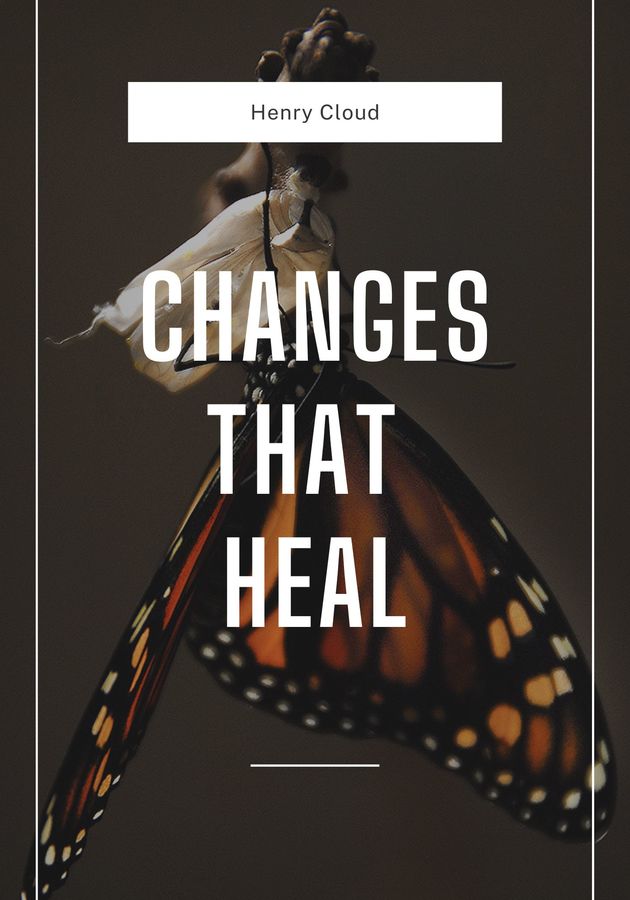The Old Testament says that we were created “in the image of God” (Genesis 1:27). In the New Testament, St. Paul reiterates this fascinating fact and turns it into an ethical creed, claiming – in his Epistle to the Romans (8:29) – that “God predestined [us] to be conformed to the image of his Son.” “What he means by that,” illuminates Henry Cloud, “is that our goal is to become more like Him – our destiny is to pursue this family resemblance to God.” Indeed, Cloud believes, “All of our problems stem from our failure to reflect the image of God.” That’s why, in “Changes That Heal,” he offers a down-to-earth plan to help Christian believers recover from their past wounds and grow into the image of God by cultivating the four most important aspects of His personality. So, get ready to learn how they are and prepare to become “a joy-filled, mature follower of Christ.”
The three ingredients of growth
In our age of instant culture – an age of uncertainty and consumerism, of globalism and media manipulations – it’s not a surprise that many of us struggle with burnouts, anxiety, and loneliness. In a way, feeling inadequate has become the norm rather than the exception. How could it not? When everything’s moving too fast, it’s only natural to fear that you might lose a step with the world unless you’re running all the time, everywhere! Unfortunately, exhausted people cannot appreciate or enjoy the beautiful things in life. To paraphrase an old African wisdom, it’s irrelevant what reaches your senses when you’re waiting for your soul to catch up with your body. How did we get here? And is there a way out?
Put simply, we are where we are, because we’ve forgotten our main mission on Earth – namely, to emulate God, in whose image we are made. God, says Henry Cloud, is able to do four things that we, his children, have difficulty doing: 1) bond with others; 2) separate from others; 3) sort out issues of good and bad; and 4) take charge as an adult. “Without the ability to perform these basic godlike functions,” writes Cloud, “we can literally remain stuck for years, and growth and change can elude our grasp.” However, before moving on to explain them better, it’s important to note that completing these developmental tasks – and, hence, growth itself – is impossible without the following three things: grace, truth, and time.
Grace is the first ingredient necessary for growing up in the image of God. Unless you are willing to connect to other people unconditionally, you’ll never grow spiritually. Being too fragile, grace needs guidance, which is where truth comes in. Just as grace is the relational aspect of God’s character, truth is the structural aspect of his personality. For grace anything goes, but truth lets nothing slide. Apart, each of them can lead to a lot of trouble for a person; together, they are capable of reversing the effects of the fall – our separation from God – by inviting us out of isolation and into relationship. That said, even together they are often powerless without the third ingredient of growth – time. Indeed, to truly mature and heal, to progress to that next stage, you need to learn to not hurry things in life. As Alexander Pope once wrote, “Only fools rush in where angels fear to tread.”
Bonding to others
Consider the lilies of the field, how they grow – they neither toil nor spin! Indeed, to a casual observer, the growth of a lily may seem a breezy, self-sufficient process, but in fact, all lilies – and all parts of a single lily – need something outside themselves to grow and flourish. Meaning, not only is everything inside a lily interdependent and well-connected – the flower to the stalk, the stalk to the roots – but the roots are also firmly buried in the soil, from wherein they draw the necessary moisture and nutrients. Needless to add, without proper sunlight, a lily, no matter how strong, would eventually grow weak and droop. The growth of a lily is just one of the millions of proofs in nature that individuality and independence are, essentially, an ethical and spiritual failure.
The Bible is pretty clear about this. The Book of Leviticus commands that you must love your neighbor as you love thyself. In the Gospels, Jesus reiterates the instruction, asserting that it is one of the two commandments on which hang “all the law and the prophets,” alongside that of loving the Lord with all your heart. Moreover, in John 15:12-13, he says the following: “This is my commandment: That ye love one another, as I have loved you. Greater love hath no man than this, that a man lay down his life for his friends.” In other words, God sees bonding – that is to say, our ability to establish an emotional attachment to another person – as the very basis for morality. According to Cloud, there are at least two other benefits of attachment: the ability to heal faster and the ability to find meaning in life.
Indeed, only people who have deep attachments can draw on the strength of others when their strength is not enough. And only they know the real reason to do anything – the other people, humanity itself. “Bonding gives meaning to one’s accomplishments,” writes Cloud, “while fueling the rest of their development.” Isolation, on the other hand, leads to feelings of meaninglessness, guilt, and emptiness, which can in turn lead to depression, addictions, and even worse. However – mostly due to past injuries, distorted thinking and acquired defense mechanisms – some people have trouble connecting to others. If you are one of them, take into consideration the fact that most of your problems probably stem from a lack of attachment, and not the other way around. So, challenge your distorted thinking and start moving toward others. Learn to embrace your vulnerability and start taking risks! Most importantly, allow yourself to be emphatic and dependent. Because, as Barbra Streisand sang in the musical “Funny Girl,” “People who need people are the luckiest people in the world.”
Separating from others
Even if only subconsciously, most spouses know that long-lasting love is all about learning how to be one as a couple while being two as individuals. Because of that, the thing they want out of a relationship is a safe place wherein they can rely on the other to be themselves. For babies, however, it’s quite the opposite. Since they have no “selves” to protect, what they want and need out of their first relationships – namely, those with their mothers and their fathers – is an almost complete annihilation of their individuality, an absolute interdependence. Indeed, lack of early bonding in humans has been shown to lead to later abuse, neglect, and failure to thrive. Consequently, as counterintuitive as it might sound, bonding must always precede separateness. In the words of Cloud, “We must be able to be ‘a part’ of someone or something before we can be ‘apart.’ Attachment gives us the safety and the strength to separate.”
We achieve separation through boundaries, which psychologically can be defined as the realization of our own person apart from the others. It is this sense of separateness that forms the basis of personal identity. Just as babies don’t have boundaries because they don’t have a personal identity, adults won’t have a personal identity unless they set some kind of boundaries. The Bible, for example, states repeatedly what God loves and hates, what he chooses to do and what he wills, as well as what he thinks about different things. All of these things define the boundaries of who he is. Since we are built in God’s image, we define ourselves in pretty much the same way – namely, through our attitudes, our feelings, our behavior, our thoughts, our abilities, our desires, our choices, and our negative assertions. Unlike God, however, we also define ourselves through our limits – that is to say, the physical boundaries of our bodies, and our finiteness in time.
When we develop unclear boundaries, we risk allowing other people to cross them. When someone invades another person’s body, we’re talking about basic violations such as hostility or rape. Everybody knows how serious and vile crossings such as these are. Yet, a few understand that our feelings, our desires and our thoughts are also our property (much like our bodies) and that we should consider the crossing over them an act of violence as well. You will never be who you want to be unless there are at least a few “noes” separating your own self from the selves of the people around you. To further develop proper boundaries, you must gain awareness of who you are and you need to assert yourself, by saying what you feel, like, want and think as often as possible. Moreover, you must stop playing victim and stop blaming others for your problem. Persevere. Become active, not reactive. Choose values and self-control over compliance and self-indulgence. Above all, be honest – there’s no better way to carve an identity for yourself than honesty.
Sorting out good and bad
According to the biblical narrative, there was a time – long, long ago, at the very beginning of history – when everything was “all good” on our planet. The earth yielded food bountifully, the wolf and the lamb fed together, and humans were without sin. But then Satan, disguised as a serpent, convinced Eve to taste fruit from the tree of the knowledge of good and evil and this act drove a wedge between God and man. God punished Adam and Eve for their disobedience by banishing them from the Garden of Eden. Ever since, humans struggle to find a way to go back. Mostly, they do this by concentrating their entire energy on finding the good in everything, and by refusing to tolerate badness, weakness, and failure in themselves or others. The problem? Well, by that logic, when things aren’t perfect, they must be bad. And things are never perfect.
We deal with the conflict between the good and bad in four different ways; however, only the last of them makes sense. Some people handle the bad in their lives by simply denying it. Their partners can’t be depressive, what they feel mustn’t be lust, their child couldn’t have done such an awful thing. Sadly, denying the bad won’t make it go away: it will only make it stronger. There is a second group of people who do the exact opposite: they deny the good. By denying it, they secretly want to level the field: when nothing is ideal, then everything can be tolerated. These are the cynics of the world: they live in badness without realizing it is bad. The most common way of dealing with the bad is attacking and judging. Meaning, most people can tell good and bad apart, but mostly attack the badness in others. They give themselves grace without truth, and others truth without grace.
The fourth way combines grace and truth. It is the way of acceptance. “In this biblical alternative,” as Cloud writes, “we accept and forgive the bad, while clinging to the ideal as an unrealized goal that we strive for in an atmosphere of full acceptance.” For a true Christian, the real issue should never be the sinner, but the sin; and the best way to deal with the sin is to get closer to the sinner. Christ’s second commandment instructs us precisely that – to accept and love each other in spite of our failures, while gently correcting each other toward the common goal of love. The “two most important medicines” in this regard are confession and forgiveness. A third one is integrating negative emotions, such as anger, sadness, and fear. To achieve this, as Geoffrey Hill once wrote, try not to look down so much upon the damned. For everybody, in their own sphere, harmonizes strangely with the divine.
Becoming an adult
After banishing Adam and Eve from the Garden of Eden, God blesses them and says: “Be fruitful and increase in number; fill the earth and subdue it. Rule over the fish in the sea and the birds in the sky and over every living creature that moves on the ground.” The single condition that God adds to “this lofty position of authority” is submission to a higher authority – Himself. According to Cloud, this is the original model of becoming an adult, the fourth developmental process to emulating your creator. He writes: “God grants us a lofty position of rulership and authority, of adulthood and responsibility, of freedom to be ‘in charge’ of our lives. Along with this comes the responsibility of submitting to God’s authority and the accountability if we fail.”
The main three aspects of being in charge are authority, responsibility, and accountability. Indeed, as Cloud remarks, “Becoming an adult is a process of taking on more and more power and responsibility as we become old enough to handle them.” This process has a lot to do with bonding, having boundaries, and being able to tell good and bad apart, but ultimately is all about “coming out from under the one-down relationship that a child has to parents and other adults, and coming into an equal standing as an adult on his or her own.” This equal standing entails assuming the sovereign and supreme position Adam and Eve were granted with upon being banished from Eden. It is obviously a position of power, expertise, office and influence. However, it is a position of submission as well.
Jesus makes this abundantly clear in Matthew 20, when he says to his apostles, “You know that the rulers of the Gentiles lord it over them, and their high officials exercise authority over them. Not so with you. Instead, whoever wants to become great among you must be your servant, and whoever wants to be first must be your slave – just as the Son of Man did not come to be served, but to serve, and to give his life as a ransom for many.” So, becoming an adult is a twofold process: assuming authority and learning how to be able to give up authority in order to serve others. To achieve both, you must reevaluate your beliefs as often as possible, especially when that means disagreeing with authority figures. You must also take ownership of your own decisions and give yourself permission to be equal with your parents. Finally, you must learn how to submit to others out of freedom – not out of weakness or necessity.
Final notes
Brimful with relevant Bible quotes and as cleanly structured as all of Henry Cloud’s books, “Changes That Heal” is an excellent manual to a happier, healthier life. But as always, it’s ours to alert you that the book’s advice is deeply religious, so large parts of it may seem as pointless to nonbelievers and sceptics as they can seem revelational to Christian believers.
12min tip
Don’t be afraid to be dependent on your friends or partners: people who need other people may not be the happiest, as Barbra Streisand sang, but they are definitely happier than people who never need other people in their lives.





























